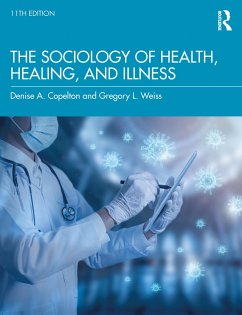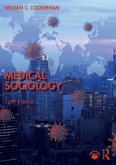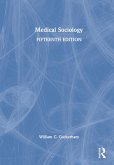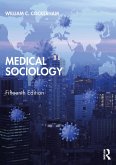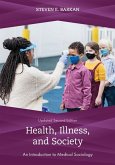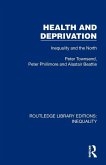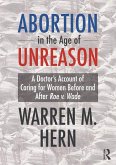- Broschiertes Buch
- Merkliste
- Auf die Merkliste
- Bewerten Bewerten
- Teilen
- Produkt teilen
- Produkterinnerung
- Produkterinnerung
This new edition links information on COVID-19 into each chapter, providing students with a solid understanding of the social history of medicine; social epidemiology; social stress; health and illness behaviour; the profession of medicine; medical ethnics; and the financing and organization of medical care.
Andere Kunden interessierten sich auch für
![Medical Sociology Medical Sociology]() William C. Cockerham (University of Alabama, Birmingham, USA)Medical Sociology104,99 €
William C. Cockerham (University of Alabama, Birmingham, USA)Medical Sociology104,99 €![Medical Sociology Medical Sociology]() William C. Cockerham (University of Alabama, Birmingham, USA)Medical Sociology196,99 €
William C. Cockerham (University of Alabama, Birmingham, USA)Medical Sociology196,99 €![Medical Sociology Medical Sociology]() William C. CockerhamMedical Sociology118,99 €
William C. CockerhamMedical Sociology118,99 €![Health, Illness, and Society Health, Illness, and Society]() Steven E. BarkanHealth, Illness, and Society75,99 €
Steven E. BarkanHealth, Illness, and Society75,99 €![Health and Deprivation Health and Deprivation]() Peter TownsendHealth and Deprivation43,99 €
Peter TownsendHealth and Deprivation43,99 €![Health and Care in Neoliberal Times Health and Care in Neoliberal Times]() NEIL SMALLHealth and Care in Neoliberal Times58,99 €
NEIL SMALLHealth and Care in Neoliberal Times58,99 €![Abortion in the Age of Unreason Abortion in the Age of Unreason]() Warren M. HernAbortion in the Age of Unreason33,99 €
Warren M. HernAbortion in the Age of Unreason33,99 €-
-
-
This new edition links information on COVID-19 into each chapter, providing students with a solid understanding of the social history of medicine; social epidemiology; social stress; health and illness behaviour; the profession of medicine; medical ethnics; and the financing and organization of medical care.
Produktdetails
- Produktdetails
- Verlag: Taylor & Francis Ltd
- 11 ed
- Seitenzahl: 480
- Erscheinungstermin: 30. Juni 2023
- Englisch
- Abmessung: 188mm x 248mm x 26mm
- Gewicht: 1198g
- ISBN-13: 9781032418124
- ISBN-10: 1032418125
- Artikelnr.: 67514559
- Herstellerkennzeichnung
- Libri GmbH
- Europaallee 1
- 36244 Bad Hersfeld
- gpsr@libri.de
- Verlag: Taylor & Francis Ltd
- 11 ed
- Seitenzahl: 480
- Erscheinungstermin: 30. Juni 2023
- Englisch
- Abmessung: 188mm x 248mm x 26mm
- Gewicht: 1198g
- ISBN-13: 9781032418124
- ISBN-10: 1032418125
- Artikelnr.: 67514559
- Herstellerkennzeichnung
- Libri GmbH
- Europaallee 1
- 36244 Bad Hersfeld
- gpsr@libri.de
Denise A. Copelton, PhD, is Professor of Sociology and Department Chair at The State University of New York (SUNY) at Brockport. One of the first social scientists to study celiac disease and gluten-free eating, her work has been published in Social Science & Medicine, Sociology of Health & Illness, Advances in Gender Research, and Deviant Behavior, among other outlets. She is co-author (with Amy Guptill and Betsy Lucal) of Food & Society: Principles and Paradoxes, now in its third edition. She regularly teaches courses on introductory sociology, sociology of health and illness, sociology of families, and aging and the life course. Her college-wide leadership was recognized in 2019 with the prestigious SUNY Chancellor's Award for Faculty Service. Gregory L. Weiss earned his PhD from Purdue University and is now Professor Emeritus of Sociology at Roanoke College. During his career, he has been an honored teacher (winning numerous college, statewide, regional [SSS], and national [ASA's Section on Teaching and Learning] awards), a dedicated researcher and writer (author of Grass Roots Medicine and co-author of Experiencing Social Research and the ASA publication on Creating an Effective Sociology Assessment Program as well as dozens of scholarly articles), and active in the community in a variety of health-, environmental-, and animal-related organizations.
Preface
Acknowledgements
List of Tables and Figures
1 A Brief Introduction to the Sociology of Health, Healing, and Illness
2 The Development of Scientific Medicine
3 Social Epidemiology
4 Social Stress
5 Health Behavior
6 Experiencing Illness and Disability
7 Physicians and the Profession of Medicine
8 Medical Education and the Socialization of Physicians
9 Nurses, Advance Practice Providers, and Allied Health Workers
10 Complementary and Alternative Medicine
11 The Physician-Patient Relationship
12 Professional and Ethical Obligations of Physicians in the
Physician-Patient Relationship
13 The United States Health Care System
14 Health Care Delivery
15 The Social Implications of Advanced Health Care Technology
16 Comparative Health Care Systems
Name Index
Subject Index
Acknowledgements
List of Tables and Figures
1 A Brief Introduction to the Sociology of Health, Healing, and Illness
2 The Development of Scientific Medicine
3 Social Epidemiology
4 Social Stress
5 Health Behavior
6 Experiencing Illness and Disability
7 Physicians and the Profession of Medicine
8 Medical Education and the Socialization of Physicians
9 Nurses, Advance Practice Providers, and Allied Health Workers
10 Complementary and Alternative Medicine
11 The Physician-Patient Relationship
12 Professional and Ethical Obligations of Physicians in the
Physician-Patient Relationship
13 The United States Health Care System
14 Health Care Delivery
15 The Social Implications of Advanced Health Care Technology
16 Comparative Health Care Systems
Name Index
Subject Index
Preface
Acknowledgements
List of Tables and Figures
1 A Brief Introduction to the Sociology of Health, Healing, and Illness
2 The Development of Scientific Medicine
3 Social Epidemiology
4 Social Stress
5 Health Behavior
6 Experiencing Illness and Disability
7 Physicians and the Profession of Medicine
8 Medical Education and the Socialization of Physicians
9 Nurses, Advance Practice Providers, and Allied Health Workers
10 Complementary and Alternative Medicine
11 The Physician-Patient Relationship
12 Professional and Ethical Obligations of Physicians in the
Physician-Patient Relationship
13 The United States Health Care System
14 Health Care Delivery
15 The Social Implications of Advanced Health Care Technology
16 Comparative Health Care Systems
Name Index
Subject Index
Acknowledgements
List of Tables and Figures
1 A Brief Introduction to the Sociology of Health, Healing, and Illness
2 The Development of Scientific Medicine
3 Social Epidemiology
4 Social Stress
5 Health Behavior
6 Experiencing Illness and Disability
7 Physicians and the Profession of Medicine
8 Medical Education and the Socialization of Physicians
9 Nurses, Advance Practice Providers, and Allied Health Workers
10 Complementary and Alternative Medicine
11 The Physician-Patient Relationship
12 Professional and Ethical Obligations of Physicians in the
Physician-Patient Relationship
13 The United States Health Care System
14 Health Care Delivery
15 The Social Implications of Advanced Health Care Technology
16 Comparative Health Care Systems
Name Index
Subject Index

